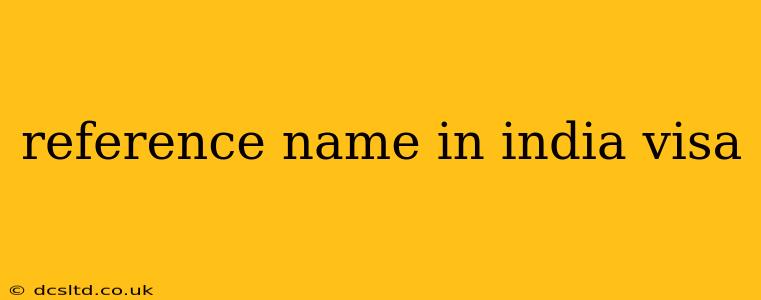Applying for an Indian visa can seem daunting, with numerous forms and requirements. One aspect that often causes confusion is the "reference name" field. This guide clarifies what a reference name is, why it's required, and how to best complete this section of your application.
What is a Reference Name in an Indian Visa Application?
The "reference name" section of the Indian visa application isn't about providing a character reference in the traditional sense. Instead, it requests the name of a person or entity who can vouch for the applicant's identity and travel plans. This person is essentially confirming the information provided in the application. Think of it as a verification point for the Indian consulate.
Think of it less as a character reference and more as a contact point for verification purposes. They are not attesting to your character, but rather to the accuracy of the information you've supplied.
Why is a Reference Name Required?
The Indian government requires a reference name to mitigate fraud and ensure the integrity of the visa application process. Having a verifiable contact person allows the consulate to cross-check details and verify the applicant's legitimacy. This protects both the applicant and the Indian government from potential misuse of the visa system.
Who Should I Use as My Reference?
The best reference is someone who:
- Knows you well: This person should be familiar with your identity and travel plans.
- Is readily contactable: The consulate may need to contact your reference to verify information, so ensure they are easily reachable by phone or email.
- Is reliable: This individual should be someone who will respond promptly and accurately to any inquiries.
- Resides in your country of origin: Although not strictly a requirement, it's generally recommended for ease of verification.
Suitable Reference Options:
- Employer: If employed, your employer is often an ideal choice.
- Family member: A close family member (parent, sibling, spouse) can also act as a reference, provided they meet the above criteria.
- Close friend: A close and reliable friend who knows your travel plans well could suffice.
Unsuitable Reference Options:
- Someone you've never met: This would not be a suitable choice as the consulate needs verification from someone who knows you personally.
- Someone who is unlikely to cooperate: If you're unsure if your reference will cooperate, it's best to choose someone more reliable.
What Information Do I Need About My Reference?
You'll typically need to provide the following information about your reference:
- Full name: Include both given and family names.
- Address: Provide a complete and accurate address.
- Phone number: Include a valid phone number where they can be easily reached.
- Email address: A reliable email address is essential for contact.
- Relationship to the applicant: Clearly state how you are related to the reference (e.g., employer, friend, family member).
What if I Don't Have a Suitable Reference?
If you struggle to find a suitable reference, it's crucial to carefully consider your options. Contacting the Indian consulate directly or consulting an immigration lawyer might provide further guidance, although it is rare that a suitable reference cannot be found.
How Do I Provide the Reference Information on the Visa Application?
The exact format and location of the reference information will vary depending on your specific application form. Follow the instructions carefully and ensure all the information is accurate and complete. Any inconsistencies could lead to delays or rejection of your visa application.
This guide aims to clarify the role of a reference name in your Indian visa application. Remember, accurate and reliable information is key to a successful application process. Double-check all details before submission and ensure your chosen reference understands their role in the process.
